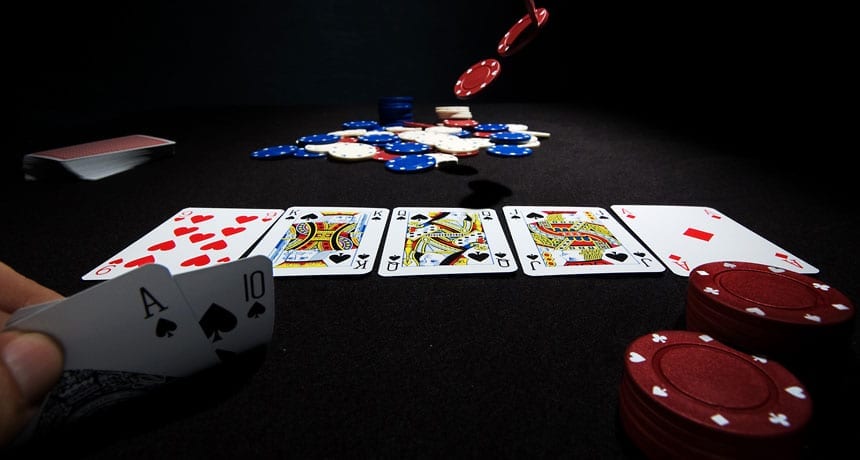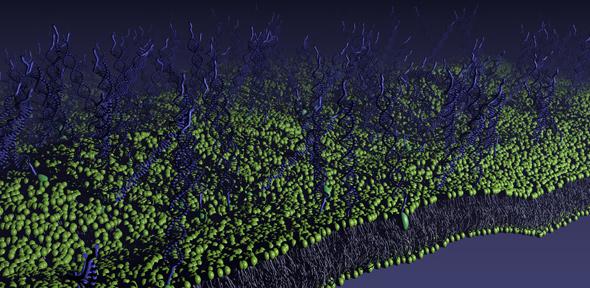
UAlberta researchers solve heads-up limit Texas hold ‘em poker.
In a world first, researchers in the Computer Poker Research Group at the University of Alberta have essentially solved heads-up limit Texas hold ‘em poker with their program, called Cepheus.
“Poker has been a challenge problem for artificial intelligence going back over 40 years, and until now, heads-up limit Texas hold ‘em poker was unsolved,” says Michael Bowling, lead author and professor in the Faculty of Science, whose findings were published Jan. 9 in the journal Science.
For more than a half-century, games have been test beds for new ideas in artificial intelligence. The resulting successes have marked significant milestones, from IBM’s Deep Blue defeating world champion Garry Kasparov in chess and Watson beating top-earning Jeopardy! champs Ken Jennings and Brad Rutter.
But as Bowling points out, defeating top human players is not the same as actually solving a game—especially a game like poker.
The challenge of imperfect information
In poker, players have imperfect information—they don’t have full knowledge of past events, and they can’t see their opponents’ hands. The most popular variant of poker today is Texas hold ‘em. When it is played with just two players and with fixed bet sizes and a limited number of raises allowed, it is called heads-up limit hold ‘em.
The possible situations in this poker version are fewer than in checkers—which U of A computing science researchers solved in 2007, led by now dean of science Jonathan Schaeffer—but the imperfect-information nature of heads-up limit hold ‘em makes it a far more challenging game for computers to play or solve.
“We define a game to be essentially solved if a lifetime of play is unable to statistically differentiate it from being solved at 95% confidence,” explains Bowling. “Imagine someone playing 200 hands of poker an hour for 12 hours a day without missing a day for 70 years. Furthermore, imagine them employing the worst-case, maximally exploitive opponent strategy—and never making a mistake. They still cannot be certain they are actually winning.”
Read more: Poker-playing program knows when to fold ’em
The Latest on: Artificial intelligence
[google_news title=”” keyword=”Artificial intelligence” num_posts=”10″ blurb_length=”0″ show_thumb=”left”]
via Google News
The Latest on: Artificial intelligence
- Explainer: How dependent is China on US artificial intelligence technology?on May 9, 2024 at 3:29 am
The Biden administration plans to put guardrails on U.S.-developed artificial intelligence (AI) models that power popular chatbots like ChatGPT to safeguard the technology from countries such as China ...
- Flavoured vapes 'could become toxic when heated' new study using artificial intelligence suggestson May 9, 2024 at 3:15 am
In a high-tech approach that could help uncover longer-term health risks of vaping, researchers used artificial intelligence to simulate the effects of heating the chemicals found in 180 flavours of e ...
- Department of Homeland Security pilots new Artificial Intelligence program for immigration processon May 9, 2024 at 2:10 am
The program seeks to train officers to review applicants for refugee states in the U.S.. The machine would not make asylum decisions.
- 2 Millionaire-Maker Artificial Intelligence (AI) Stockson May 9, 2024 at 1:55 am
Snowflake ( SNOW -0.82%) and Super Micro Computer ( SMCI 0.41%) have become pivotal in the development and growth of artificial intelligence (AI) technology. These stocks have the ingredients to ...
- Advances in artificial intelligence mean 'deadbots' can 'haunt' the living, warn experts. Here's what it meanson May 8, 2024 at 8:31 pm
Also read | AI attempts to bring dead back to life, give people closure As per the University of Cambridge researchers, "Artificial intelligence that allows users to hold text and voice conversations ...
- 1 Artificial Intelligence (AI) Stock Down 29% to Buy Right Now Before It Soars 78%on May 8, 2024 at 7:30 am
This chip stock tanked following the release of the company's latest earnings report, but investors shouldn't miss the bigger picture.
- Artificial Intelligence And Human Expertise In Graphic Designon May 8, 2024 at 4:15 am
Technology has long been a key part of graphic design, but modern AI-powered tools are going beyond traditional tools by leaps and bounds.
- A university creates an artificial intelligence institute, partly to help governmenton May 7, 2024 at 3:06 pm
The University of Maryland has launched of a new institute dedicated to developing the next generation of artificial intelligence people.
- 5 things to know for May 7: Gaza, Tornado outbreak, Boeing, Artificial intelligence, Peanut recallon May 7, 2024 at 3:59 am
Here’s what else you need to know to Get Up to Speed and On with Your Day.
- How artificial intelligence is helping Ghana plan for a renewable energy futureon May 6, 2024 at 4:59 pm
The technology is helping the West African nation to invest wisely in infrastructure, prioritising energy and food security, but also human health.
via Bing News










